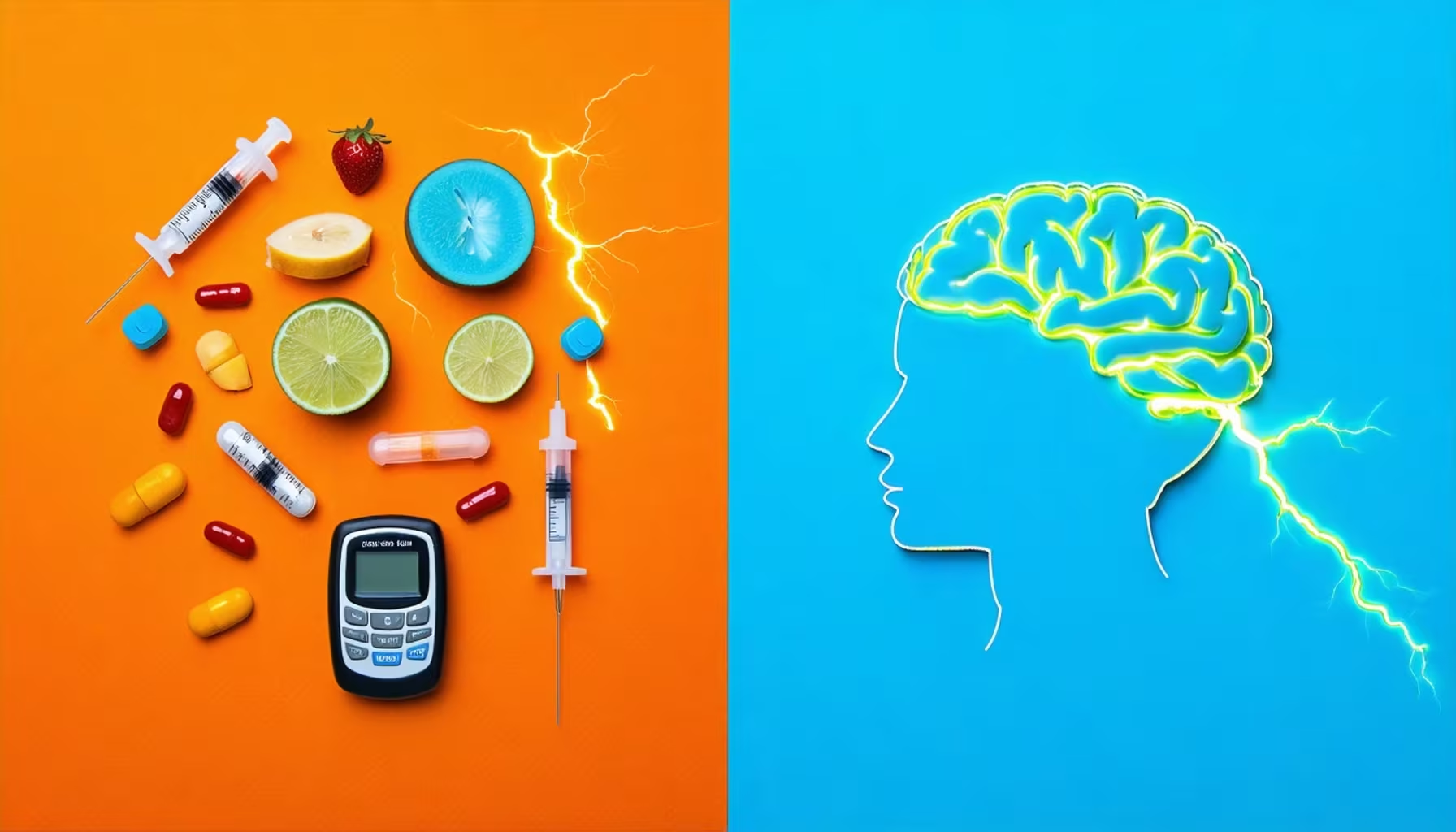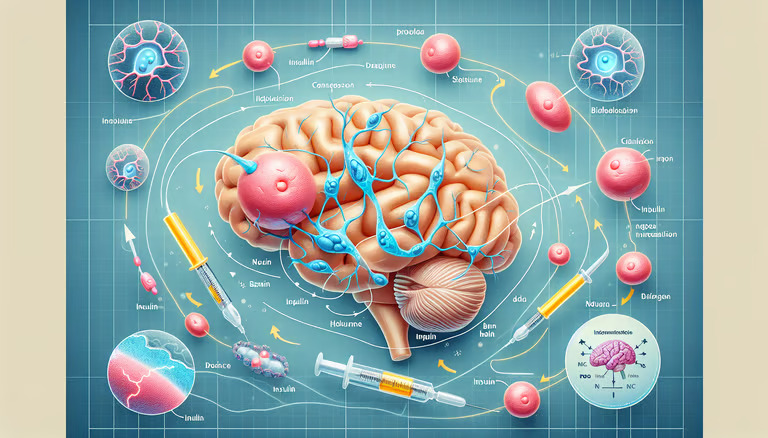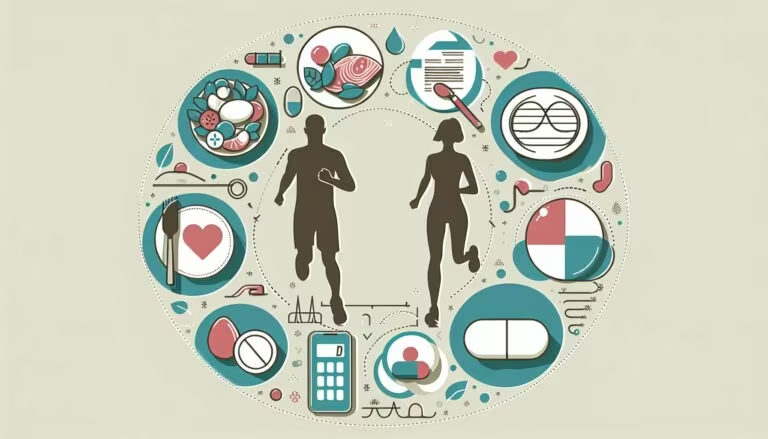Can Diabetes Cause Seizures? Let’s Find Out Together
Can diabetes cause seizures? Let’s explore this and uncover tips for managing diabetes and seizures together.
Answers: Can Diabetes Cause Seizures?

Understanding Seizures in Diabetes
Diabetes struts into the picture when brain function goes off-kilter because of wavering blood sugar levels. These swings, either sky-high (hyperglycemia) or scraping the bottom (hypoglycemia), can bring seizures into play.
About a quarter of people with diabetes find themselves in the seizure boat. Times of diabetic ketoacidosis (DKA) also hike the seizure count for those wrestling with diabetes. Basically, whether it’s a long-haul struggle or a sudden flare-up, diabetes doesn’t play fair when it comes to triggering seizures.
| Blood Sugar Level | Seizure Odds |
|---|---|
| Hypoglycemia (Low) | Up |
| Normal | Same Old |
| Hyperglycemia (High) | Yep, Up |
| Diabetic Ketoacidosis (DKA) | Way Up |
For adults, the more sugar in the blood, the more likely they’ll be caught in a seizure’s grip. Research tells us that high sugar is like pouring fuel on the fire for seizures.
Diving into studies on both the lab rats and humans shows that wacky glucose levels, either low or high, can set off seizures. Folks with high blood sugar just have a knack for landing in seizure territory.
Fresh studies unearthed that diabetes doubles the chances of having epilepsy compared to those without the condition. Genes, inflammation, metabolic hiccups, and getting older all stir this pot of increased seizure risk (NCBI).
Peeking into diabetes and its grabby tendrils, questions like can anorexia cause diabetes? or can chemo cause diabetes? pop up. Curiosity might lead you to ask, can diabetes cause vertigo? or whether can you donate plasma with diabetes?. Knowing how these dots connect can be key in steering diabetes better.
Diabetes and Neurological Complications
Diabetes doesn’t just mess with your sugar levels; it can also throw your nerves for a loop. A couple of issues worth keeping an eye on are how it mixes with anorexia and what’s the story with vertigo.
Relationship between Diabetes and Anorexia
First off, let’s chat about how these two conditions play into each other. Diabetes is like that unruly party guest who causes sugar to dance uncontrollably in your bloodstream, courtesy of either a rebellious pancreas or resistance from your cells. Anorexia, on the flip side, is an eating disorder that makes folks terrified of gaining weight—so much so, that they might dodge meals like it’s a part-time job.
Sometimes, if diabetes isn’t managed properly, it can lead people to adopt harmful habits like skipping meals or restricting food, hoping to keep blood sugar levels in check. This can be a slippery slope towards developing anorexia. Similarly, those struggling with anorexia might not keep their diabetes in check, causing their blood sugar to swing more wildly than a ’90s boy band concert. Got curiosity? Swing by our article on can anorexia cause diabetes.
Check out this table breaking down symptoms you might bump into:
| Symptom | Diabetes | Anorexia |
|---|---|---|
| Always Thirsty | Yep | Nope |
| Dropping Weight Unexpectedly | Yep | Yep |
| Extreme Hunger | Yep | Nope |
| Dizzy Spells | Yep | Yep |
| Always Tired | Yep | Yep |
| Scared of Gaining Weight | Nope | Yep |
Even though there are some similar symptoms, each condition brings its own unique baggage. Tuning into both requires a bit of balancing act to cover all bases.
Exploring Diabetes and Vertigo
Next up, we’ve got vertigo to piece together. Vertigo makes you feel like you’re spinning without any roller coaster in sight, often because of tangles in your inner ear or headspace. Since diabetes can mess with your nerves—known as diabetic neuropathy—it might just mess with your ears too, making them feel like they’re on a spinning ride (Mayo Clinic).
When vertigo hits someone with diabetes, it can leave them feeling wobbly and cause nasty spills. Decoding what’s happening can lay the groundwork for managing the symptoms. Swipe through our complete breakdown on can diabetes cause vertigo.
Here’s a quick peek at how these kiddos get along:
| Aspect | Diabetes | Vertigo |
|---|---|---|
| Sugar Highs | Yes | No |
| Frayed Nerves | Yep | Maybe |
| Dizzy or Spinning Feeling | Sometimes | Definitely |
| Can’t Stay Balanced | Yep | Yep |
Keeping sugar levels from going rogue can help dodge vertigo. And don’t forget—a sprinkle of healthy habits and the occasional doctor’s visit can work wonders. If you’re gathering info on managing all that diabetes throws at you, peek at our piece on can chemo cause diabetes.
Grabbing a handle on how diabetes plays with your nervous system can make living with it a bit less of a headache. With a smidgen of know-how and strategy, you can keep these complications at bay.
Diabetes Complications
When it comes to managing diabetes, knowing the potential complications is key. You’ve got things like seizures, and the question often pops up about whether folks with diabetes can donate plasma.
Impact of Diabetes on Seizures
Diabetes can shake things up and cause seizures. Picture this: seizures happening because the blood sugar’s throwing a fit — dropping too low (hypoglycemia) or skyrocketing too high (hyperglycemia), messing with the brain’s mojo (CDC). Here’s how:
| Blood Sugar Condition | Impact on Seizures |
|---|---|
| Hypoglycemia | Sparks seizures due to not enough glucose feeding the brain, making neurons go haywire. |
| Hyperglycemia | Trips up brain function by causing metabolic and electrolyte chaos. |
Research has our backs on this one, abnormal glucose levels, either high or low, can trigger seizures. For example, if someone’s dealing with hyperglycemia, they’re more likely to experience seizures. Plus, seizures can mess with glucose metabolism, crank up insulin resistance, and tweak neurotransmitter levels, shaking up glucose balance (NCBI).
Check out more on how diabetes can spin your head around with our article on can diabetes cause vertigo.
Can Diabetics Donate Plasma?
A common head-scratcher: can people with diabetes give plasma? The short answer is yes, if they’ve got their ducks in a row and blood sugar’s behaving.
Keep in mind these plasma donation checkboxes:
- Stable Blood Sugar: You gotta keep glucose levels steady, no roller coaster rides.
- Medical Clearance: A thumbs-up from your healthcare pro makes sure it’s cool to donate.
- No Serious Complications: You need a clean bill of health without severe diabetes-related hurdles.
For the full skinny, visit our guide on can you donate plasma with diabetes.
It’s smart for those with diabetes to chat with their doctor before diving into plasma donation. Keeping diabetes in check and getting the green light from a doc helps make savvy choices about giving plasma a go.
Preventive Measures
Managing diabetes isn’t just about numbers; it’s about dodging life’s little curveballs like seizures. Here’s our two cents on juggling both diabetes and seizures, plus some lifestyle tweaks that can keep things ticking smoothly.
Managing Diabetes and Seizures Together
So what’s the deal with the potential cause of seizures from diabetes? They can hit when blood sugar levels either nosedive (hypoglycemia) or skyrocket (hyperglycemia), scrambling brain signals. That’s why keeping a lid on diabetes management is all about keeping seizures at bay.
Where does blood sugar fit into this?
| Blood Sugar Levels (mg/dL) | What it Means | Seizure Chance |
|---|---|---|
| <70 (Too Low) | Dangerously low | High |
| 70-130 (Sweet Spot) | Just right | Low |
| >180 (Too High) | Dangerously high | Medium to High |
- Regular Check-Ups: Keep a sharp eye on those blood sugar numbers daily. Spotting trends early means steering clear of highs and lows well before they cause trouble.
- Stick to Your Meds: Following your medication schedule like clockwork can keep blood sugar swings in check. Miss a dose, and you might just invite trouble.
- Eat Right: Whole foods like veggies, whole grains and proteins help keep your blood sugar level steady as she goes. It’s like giving your body premium gas instead of junk fuel.
- Get Moving: Exercise is your friend, not only because it helps with insulin but it also stabilizes sugars. Just don’t forget to keep tabs on your levels, avoiding post-workout crashes.
- Game Plan for Emergencies: Have snacks or glucose tablets nearby. Trust me, you’ll thank yourself when blood sugar takes an unexpected nose dive.
Lifestyle Choices and Diabetes Link
A sprinkle of healthy changes can go miles, not just keeping seizures in check but also tackling other diabetes-connected problems like stroke.
- Eat Smart: Pile on those veggies, fruits, and lean proteins. They’re the backbone of blood sugar control and overall well-being.
- Mind that Scale: Trimming extra pounds really does matter. Dropping just 7% of your weight can dial down diabetes risk. If you’re at 200 pounds, shedding 14 might just change your life.
- Move More: Aim for at least 150 minutes of exercise per week—whether that’s dancing, biking or a swim at the Y.
- Ditch smoking: Smoking is like adding logs to a diabetes fire—more heart issues and the list goes on.
- Watch the Booze: Alcohol can throw your blood sugar loop. Stick to your limits and talk to your doc about what’s okay for you.
- Chill Out: Stress and sugar levels are like frenemies—never a good combo. Find your zen through meditation, chill activities, or whatever floats your boat.
Taking these steps gets us ahead of the curve, managing diabetes better and curbing those pesky seizures. Curious about, “can diabetes cause seizures” and more? Check out can diabetes cause vertigo and can you donate plasma with diabetes and dive deeper into your diabetes journey!
Image Credit







Leave a Reply